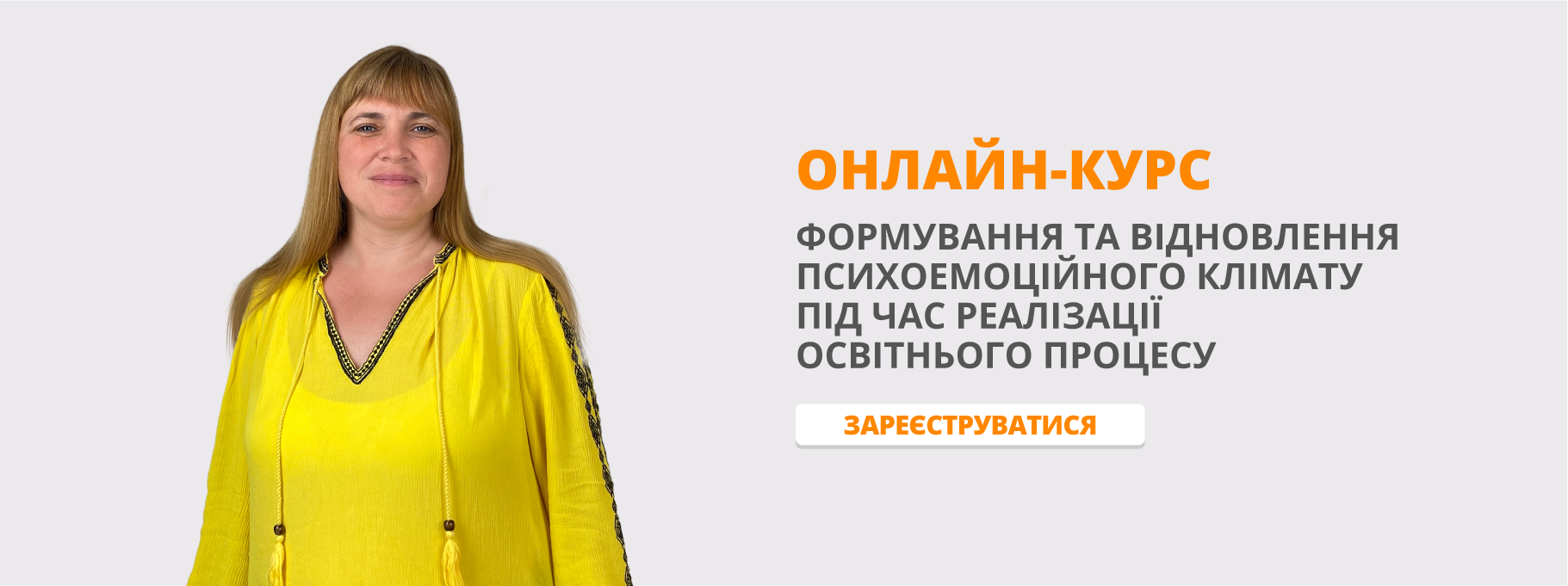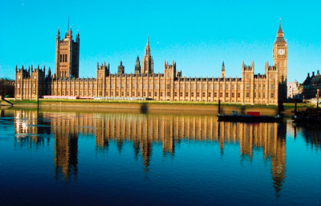Конспект уроку з англійської мови для 8 класу на тему " Welcome to Great Britain. Present Perfect Passive"
Подорож Великобританією використовуючи граматичні матеріали про Present Perfect Passive з використанням елементів рольової гри. Цікаві, пізнавальні, розвиваючі матеріали.
Lesson 2
Theme. Welcome to Great Britain. Present Perfect Passive
Objectives:
- Practical: to practice in using the Present Perfect Passive in pupils’ answers; practise their skills in speaking, reading, working in groups.
- Educational: to train new grammar material; to expand pupils’ vocabulary.
- Developing: to develop grammar and communicative skills, their logical and critical thinking, pupils’ imagination.
- Upbringing: to teach pupils to love English, how to analyze, generalize and compare the main idea of the material; to discover cultural and moral values through varied creative classroom activities.
Supplies: sheets of paper with the tasks, cards, hand out “Jigsaw sentences”, computer presentation, pictures of sights of London, the text for reading, a tape recorder, the song “Imagine” .
Type of the lesson: combined lesson
Procedure
I. The beginning of the lesson.
1. Greeting.
T: Good morning! How are you getting on?
Ps: We are very well!
T: I am glad to see you again. The weather is fine today, the sun is shining brightly in the blue sky, it is warm, the birds are twittering, the air is full of freshness and aroma of flowers. The warmth brings new hopes and joy. I think, you are in good spirit, good health. Tell me, please, how are you?
P1: I am fine, thank you.
T: How is your mother?
P1: OK. Thanks a lot.
T: How is your sister, Ann?
P2: She is not well. She feels bad because she has a sharp toothache.
T: Oh, it’s a pity. How is your brother, Nick?
P3: He is down with flue. He has a high temperature, a headache and a cough.
T: Oh, I am very sorry indeed.
2. Introducing the theme and aims.
T: Today are going to pay a friendly visit to Great Britain and its capital London and get to know new grammar material Present Perfect Passive.
3. Warming up.
Game “Jigsaw sentences”
T: A set of jigsaw sentences is given to each pair or group of four pupils. You should make up 3 sentences, read and translate them after that. Which group will be the first one to make up the sentences?
Jigsaw sentences: (the cards are mixed)
|
The United Kingdom of Great Britain |
|
|
on islands |
|
|
is situated |
|
|
and Northern Ireland |
|
|
|
|
|
There are |
|
|
many countries |
|
|
by sea |
|
|
Great Britain |
|
|
which are connected with |
|
|
|
|
|
Thanks |
|
|
is mild |
|
|
Great Britain |
|
|
the climate of |
|
|
to the Gulf Stream |
|
II. The main part of the lesson.
1. Checking up homework. Group work (Role-play).
T: Your homework for today was to find some information about Great Britain and introduce it in unusual way.
P1: As you know, the official name of the country is the United Kingdom of Great Britain and Northern Ireland. It consists of 4 countries: England, Wales, Scotland and Northern Ireland. It is washed by the Atlantic Ocean, the Irish Sea and the English Channel. Great Britain is a highly developed industrial country with the population of about 56 mln people. The main branches of British industry are machine - building, ship - building, electronics, metallurgy, textile industry. Agriculture is still one of its most important industries.
London is the capital of Great Britain. It is one of the largest cities in the world. It consists of 4 parts: the City, the West End, the East End and Westminster. There are a lot of sightseeing in London. But before traveling lets listen to the weather - forecast, because the weather in London is often changeable and we must know what things take with us. Turn on your TV set, please and listen to the weather commentator.
Weather commentator (повідомлення з TV- макету):
Good morning. Let me introduce myself. I am Inna Tsymbaliuk. I am a weather commentator. I want to inform you about the weather forecast for tomorrow. It’s winter now. Frost is expected at night. But as you know the Atlantic Ocean, influences the climate of Europe, that’s why tomorrow they are expecting a windy day, rain and humidity. Temperature will rise from -4+5С°. I advise you to take your umbrellas and put on rain-coats. Thank you. Good bye.
P2: So, we see that according to the weather forecast they are expecting rain. Let’s remind a poem “Rain”. 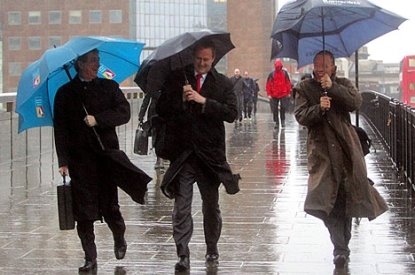
|
It was raining (3 times) hard. It was falling on my head. It was falling on my stars. It was falling on the sun It was falling on my shoes. I got soaking wet (twice). But I stayed outside (twice). The rain was sweet, The rain was warm The rain was soft It reminded me of home.
|
|
(The song “Imagine” by John Lennon is heard. Pupils are divided into two groups - delegates from Ukraine and the English. One can see pictures of different sights of London on the blackboard).
P1: Welcome to Great Britain. We are glad to meet a delegation of Ukrainian pupils in our country. First of all I’ll tell you some words about the United Kingdom, its geographical position and then answer all your questions. I’d like to start with a part of Rudyard Kipling’s poem.
The Glory of the Garden
Our England is a garden that is full of stately views,
Of borders, beds and shrubberies and lawns and avenues,
With statues on the terraces and peacocks strutting by;
But the Glory of the Garden lies in more than meets the eye…
Our England is a garden, and such gardens are not made
By singing:”Oh, how beautiful!” and sitting in the shade,
While better men than we out and start their working lives
At grubbing weeds from gravel-paths with broken dinner-knives…
Do you like this poem? I hope you do because it’s a beautiful description of Motherland.
P2: United Kingdom is a sovereign island country located off the north-western coast of continental Europe. The United Kingdom includes the island of Great Britain and many small isles. The largest island Great Britain is linked to France by the Channel Tunnel. The United Kingdom is governed by a parliamentary system: a seat of government in London and a constitutional monarchy with Queen Elizabeth II, as the head of state. The flag of the United Kingdom is the Union Jack. The national anthem of the United Kingdom is “God Save the King”. Have you questions?
P3: I don’t like your weather. It’s the end of winter, but it’s rather cold. It was raining the whole day yesterday and we got wet to the skin and bones. What can you say about the climate of Great Britain?
P4: The United Kingdom has a temperature climate with plentiful rainfall all year round. The temperature varies with the seasons but seldom drops below - 10C° or rises above 35C°. The prevailing wind is from the southwest, bearing frequent spells of mild and wet weather from the Atlantic Ocean. Snow fall can occur in winter and early spring. But the weather changes very often. That’s why England people are constantly talking about the weather.
P5: I want to know more about London and its sightseeing. What are the most wonderful places of interest in the capital?
P6: London is one of the largest cities in the world. It’s more than 2 thousand years old. London’s most famous sights are Tower Bridge, Big Ben and the Houses of Parliament, Trafalgar Square, St. Paul’s Cathedral. We start from Trafalgar Square. On the column in the center there is a statue of Admiral Nelson. To the left you can see the National Gallery. It has a fine collection of European paintings. Piccadilly Circus is the meeting point of six streets.
Buckingham Palace is the home of the Queen. On the left you’ll see St. Jame’s Park. Here you can see pelicans and ducks. There are a lot of parks and gardens in London. Hyde Park is a very democratic park. Here any one can stand up and say what he wants. In Regent’s Park there is the London zoo.
The Houses of Parliament is the seat of the British government. Big Ben is one of the most famous clocks in the world. Westminster abbey is a royal church. Here you can see the tombs of many British kings and queens From Tower Bridge you can see the Tower of London. It was a fortress a royal palace and later a prison. It is a museum now.
P7: Are there any famous museums or galleries in London?
P8: Of course, there are many of them. You may visit the British museum. It’s one of the biggest. It was built in 1852. There is a big collection of Egyptian, Greek and Roman arts. The collections are arranged with great care, so everything is clear for the visitor. The library of the museum is also very big. There is a manuscript room in the library. Here you can see the Magna Charta and other important documents.
The National Gallery is situated in the centre of the city, in Trafalgar Square. It’s one of the best picture collections in the world. You can see paintings from almost all over the world. Works by Rubens, Goya, and Leonardo da Vinci are represented here.
The Science Museum has national collections of science, industry and medicine. There are also many interesting museums in other cities and towns in Great Britain.
P3: I am very fond of music. I like your rock group “The Beatles”. Their music contained a new sense of melody. The lyrics of their songs were more imaginative and meaningful.
P4: I agree with you. I am crazy about their songs too. If you don’t mind lefts listen to one of my favorites songs. “Imagine” by J. Lennon.
The Ukrainian delegates: Thank you very much for your interesting information, kindness, hospitality, warmth. We have learned a lot about your country. Next year we’ll expect you in Ukraine. Welcome to our native land.
P2: Thank you very much for your invitation. We’ll visit Ukraine by all means.
2. Relaxation.
T: Students, I am sure you like the excursion about Great Britain and London. But it seems to me you are tired.
1. Stretch your hands move them up and down.
2. Make a circle with your hands, stretch them.
3. Move your arms up and forward, to the sides and down.
4. Cross your arms and move them up and down.
5. Let’s stretch our shoulders, move them for ward one by one, slowly and now faster.
6. Cross your shoulders and sit down 1, 2 stand up!
7. And now step right and clap, 3 steps left and clap, 3 steps forward and clap, 3 steps back and clap.
8. 3 steps right and clap, 3 steps left and clap, 3 steps forward and clap, 3 steps back and clap.
9. Let’s jog.
T: So, after a short rest we’ll continue our work. Let’s have puzzles for fun.
3. Listening.
T: Say, please, what the capital in England is.
(“E” is the capital in the word “England”.)
T: Listen to the puzzle and say “What city is it?”
|
My first letter is in jelly, it isn’t in jam, My second’s in bacon, it isn’t in ham, My third is in nine, and also in ten, My fourth is in hideout, and also in den, My fifth is in no, it isn’t in yes, My sixth is in round, you’ll not find in chess, My whole is a city you’ve heard I know, It’s a place to which thousands of sightseers go. (London) |
|
4. Presenting and practicing Grammar. (It can be a computer presentation).
THE PASSIVE VOICE
The Active sentences focus on what the person (subject) does, did, or will do.
The passive sentences focus on the object of the action:
e. g. My Granny bought vitamins for me. (Active Voice.)
e. g. Vitamins were bought for me. (Passive Voice.)
We use the Passive Voice if we don't know, don't care or don't want to say who (or what) did the action. The Passive Voice focuses on processes rather than on people.
We form the Passive Voice by means of the verb to be and the third for (Past
Participle) of the main verb.
Changing from Active into Passive.
The object of the active sentence becomes the subject in the passive sentence.
The active verb changes into a passive form.
The subject of the active sentences becomes the agent.
The agent is not mentioned when:
-it is unknown;
-it is unimportant;
-it is obvious from the context.
Present Perfect Passive Voice
To be + V3
|
Positive |
Negative |
|
They have been visited |
They have not been visited |
|
It has been built |
It has not been built |
|
Question |
Answer |
|
Have the museums been visited by many friends the other days? Has it been built yet? |
Yes, they have./ No, they haven’t (have not).
Yes, it has. / No, it hasn’t (has not). |
|
Use |
Example |
|
When the person or thing that has done the action isn’t important, or when we don’t know who has done it. |
Coffee has been grown in Brazil. |
5. Reading.
1) Pre-Reading Activity.
T: Let’s do some kind of activity before reading the text “The Canterville Ghost”.
Complete the sentences (Active or Passive Voice). Use Present Perfect Simple.
1. The island __________ (to wash) by the Pacific Ocean.
2. The Indian Ocean __________ (to wash) this island.
3. The information __________ (to receive) yesterday.
4. We __________ (to receive) the results of the experiment yesterday.
5. The pictures of this artist __________ (present) at the exhibition a month ago.
6. She __________ (to deliver) in two days.
7. My friend __________ (to deliver) you my present next week.
8. The city __________ (to situated) in the south of the country.
9. This legend __________ (to tell) to all the tourists.
10. The article __________ (to publish) a month ago.
2) While-Reading Activity.
T: As you know England is full of castles. They said that ghosts lived in some of them troubling people many years ago. Have you ever heard about “The Canterville Ghost” by Oscard Wilde?
What is this book about? Read the text and show the Passive Voice in the text.
The Canterville Ghost
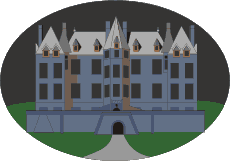 When the American, Mr Otis, bought Canterville Castle, everyone told him that this was very foolish, as the place was haunted. But Mr Otis answered, “I come from a modern country, where we have everything that money can buy. And if there were such a thing as a ghost in Europe, we would have it at home in one of our museums.”
When the American, Mr Otis, bought Canterville Castle, everyone told him that this was very foolish, as the place was haunted. But Mr Otis answered, “I come from a modern country, where we have everything that money can buy. And if there were such a thing as a ghost in Europe, we would have it at home in one of our museums.”
A few weeks later, on a lovely July evening, Mr Otis, his wife and their children, Washington, Virginia and the twins, went down to their new home. When they entered the avenue of Canterville Castle, the sky suddenly became dark and a spooky stillness was in the air.
Mrs Umney, the housekeeper, led them into the library of the castle, where they sat down and began to look around. Suddenly, Mrs Otis saw a red stain on the floor just by the fireplace and said to Mrs Umney, “I am afraid something has been spilt there.”
“Yes, madam,” said the old housekeeper in a low voice, “blood has been spilt on that spot.”
“How terrible,” said Mrs Otis; “I don't want any blood-stains in my sitting-room. It must be removed at once.”
The old woman smiled and answered, “It is the blood of Lady Eleanore de Canterville, who was murdered on that spot by her husband, Sir Simon de Canterville, in 1575. Sir Simon disappeared seven years later. His body has never been found, but his ghost still haunts the Castle. The blood-stain is a tourist attraction now and it cannot be removed.”
“That is all nonsense,” said Washington, the eldest son of the Otis family, “stain remover will clean it up in no time,” and he took a bottle of stain remover out of his pocket and cleaned the spot. But as soon as the blood-stain had disappeared, a terrible flash of lightning lit up the room and a fearful peal of thunder made the whole building shake.
3) Post-Reading Activity.
Game “What's been changed?”
Present perfect passive group speaking activity.
Procedure:
Divide the pupils in two (more or less) equal groups: A and B. Write up on the board and tell the pupils that this activity is called "What's been changed?"
Tell the pupils to memorize the position and state of everything in the room (allow 2 minutes).
Tell the pupils that group A is going to leave the room for 5 minutes, and during that time group B will change things in the room. When the pupils in group A come back, they will have to identify what's been changed.
Scoring:
Each pupil in group A who uses the target structure to identify a change gets 1 point.
If the pupil identifies an actual change, they get an additional 1 point. Points are not given to a pupil who catches an error and corrects it gets the point. This encourages attentiveness and greater participation by all the pupils.
The pupil with the most points after the time limit all changes have been identified wins.
In any case, the dialogue should go something like this:
Pupil A1: "A-ha! The lights have been switched off.
Pupil B: "That's right. They've been switched off." (pupil A1 = 2 points)
Pupil A2: "And you moved the dictionary."
Pupil A1: "No, you're supposed to say the dictionary has been moved.'"
Pupil B: "No, it hasn't been moved." (pupil A2 = 0 pt, pupil A1 = 1 pt)
Use these clues:
switch on / off + the lights / television
move + table / chair / rubbish bin or wastebasket / clothes
open / close + the window / cabinet or cupboard / book / box
wipe or erase + the board
write / draw + on the board
unplug / plug in + the television / cassette or DVD player
put away + pens / pencils / notebooks / books...
turn over + notebooks / books
6. Practice activity. Exercises on Present Perfect Passive according to different pupils’ levels.
a) Chain work.
P1: We have written the dictation.
P2: The dictation has been written. Kerrie has paid the bill.
- I have eaten a hamburger.
- We have cycled five miles.
- I have opened the present.
- They have not read the book.
- You have not sent the parcel.
- We have not agreed to this issue.
- They have not caught the thieves.
- Has she phoned him?
- Have they noticed us?
b) Using the computer presentation.
- News: put the verbs into the Present Perfect Passive.
1. A new university ………. in Kew today by the Prince of Wales. (open)
2. Lord Retlaw ………. for drunk driving. (arrest)
3. An old painting from a school in Wales ………. for $250,000 by an American museum. (buy)
4. An 18-year-old soldier ………. in an accident in Devon. (kill)
5. The two lost children ………. Alive and well in a London park. (find)
6. An unknown actor ………. to star in the new film of ‘Macbeth’. (choose)
c) ‘It’s never been done.’ Make a sentence for each picture.
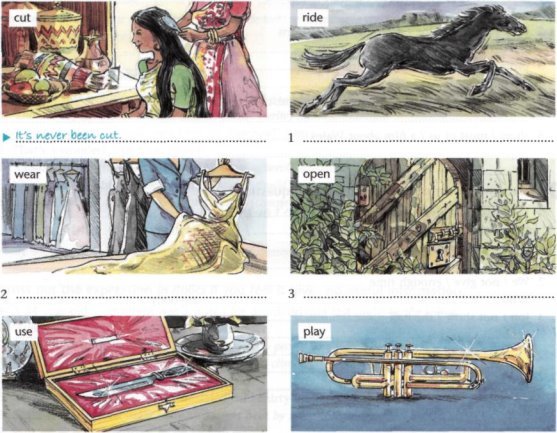
d) Exercises 4, 7 page 113-114.
- Make up interrogative and negative sentences from the following:
Example: A new library has been built in our street.
Has a new library been built in your street?
A new library has not been built in our street.
1. Many schools have been constructed this year.
2. The new project has been finished already.
3. Our library has been turned into a shopping centre.
4. The problem has been discussed already.
5. The letters have been posted.
- Correct the mistakes.
1. Your homework must finished by Monday.
2. The house is been decorated recently.
3. Mike has been tell about his new school.
4. The letters were being opened every morning in the office.
5. The woman seen taking the children to school.
7. Writing.
T: Write passive sentences in Present Perfect.
- the postcard / send – The postcard has been sent.
- the pencils / count
- the door / close
- the beds / make
- the mail / write
- the trees / plant
- the money / spend
- the room / book / not
- the rent / pay / not
- the people / inform / not
8. Role play.
T: Imagine you are an editor of the paper “English Bridge” and you want to know if the boys and girls have done everything to release the current issue of the paper. Ask as many questions as possible. Use the Present Perfect form.
Phrases for help: to write articles; to make photos; to compose poems; to write jokes; to collect interesting materials from magazines; to draw pictures; to design pages; to finish the leading article; to make up a crossword; to choose questions for the quiz; to print the texts; etc.
III. Finishing of the lesson.
1. Summing up.
T: At our lesson we spoke about Great Britain, tried to understand how to form and use the Present Perfect Passive. I want you to sum up the lesson yourselves. You are welcome.
2. Homework.
T: Group 1: WB Exercise 1-3, page 34-35;
Group 2: Write down 10 sentences (affirmative, negative, interrogative) in Present Perfect Passive.
3. Analysis of pupils’ answers. Assessments.
T: You worked hard today. You were active and attentive. You marks are… . I enjoy working with you.

1


про публікацію авторської розробки
Додати розробку
